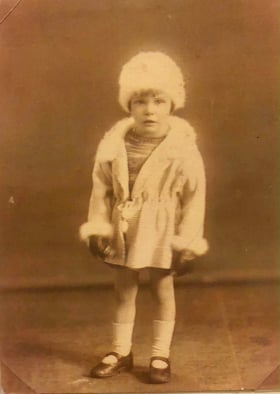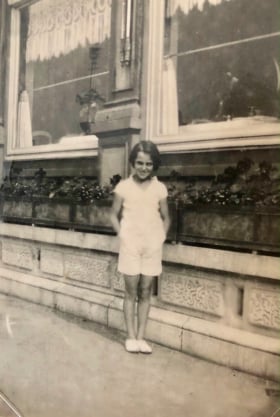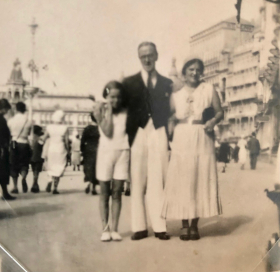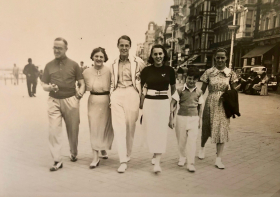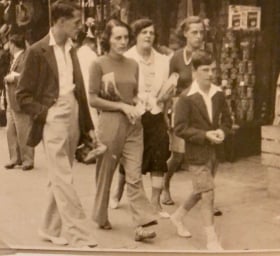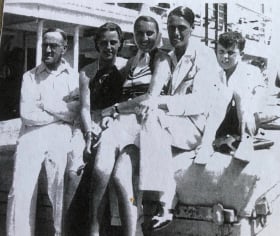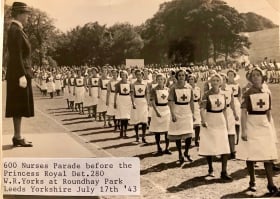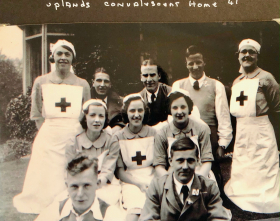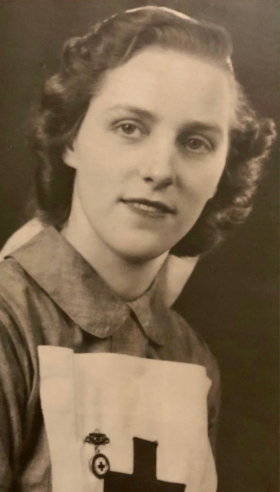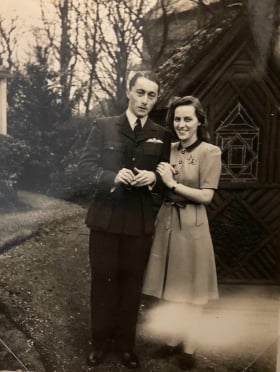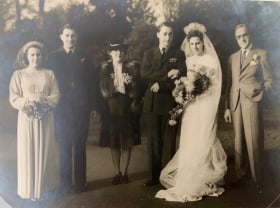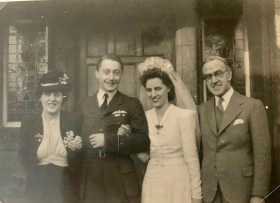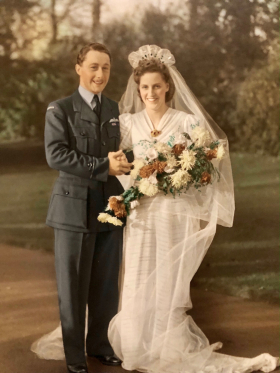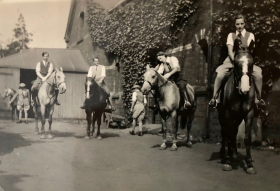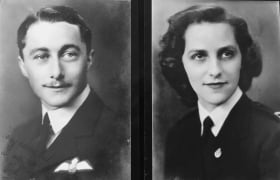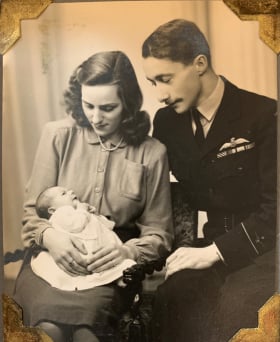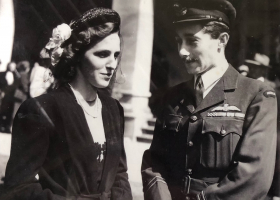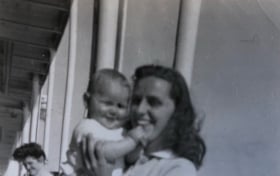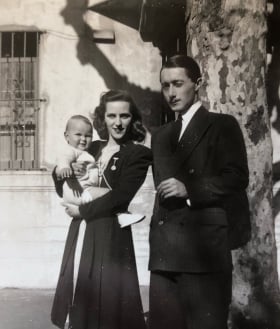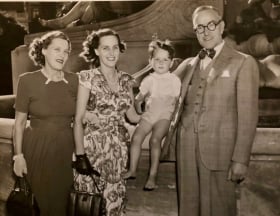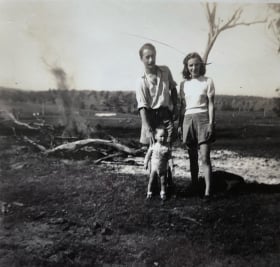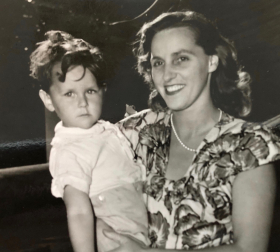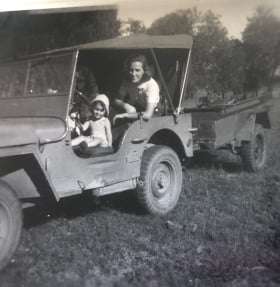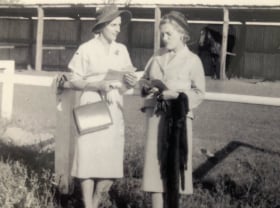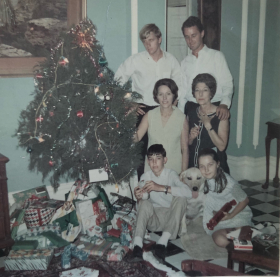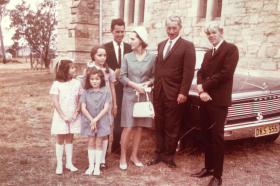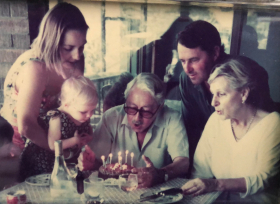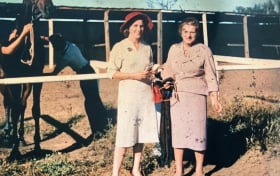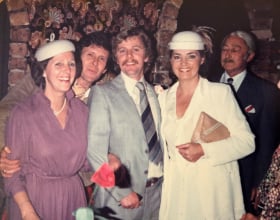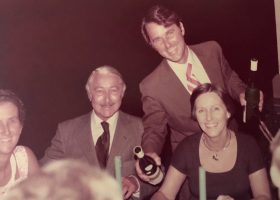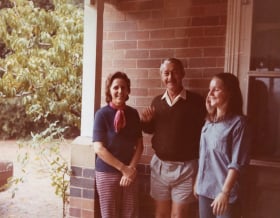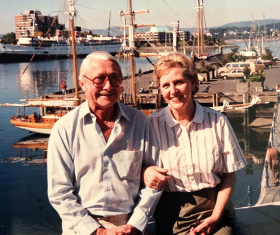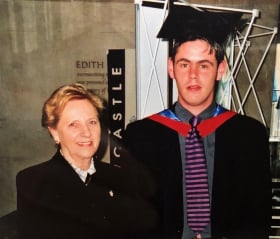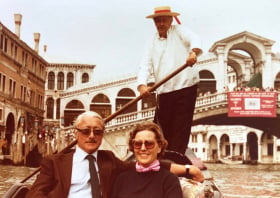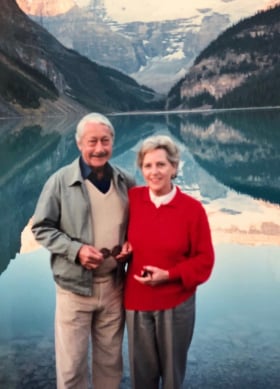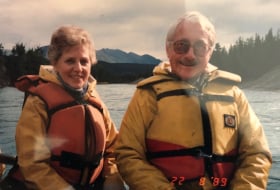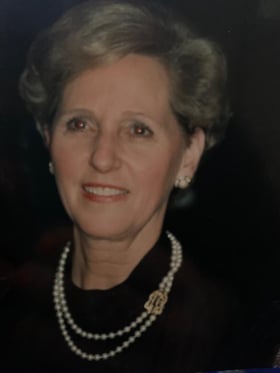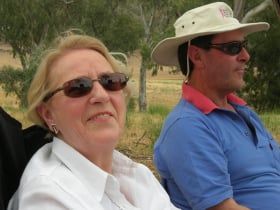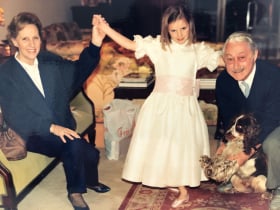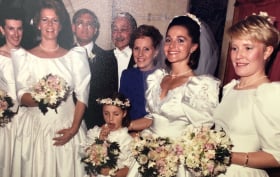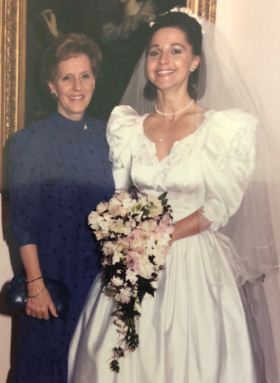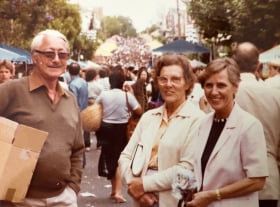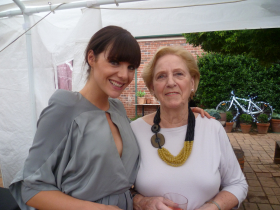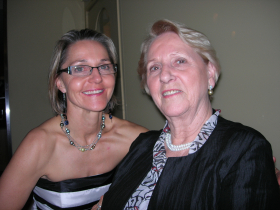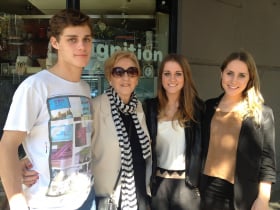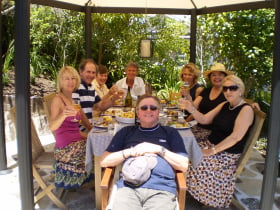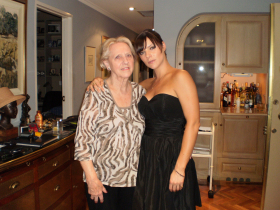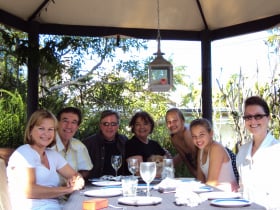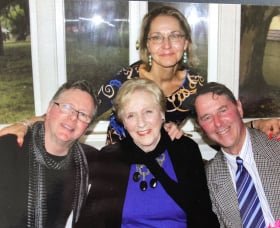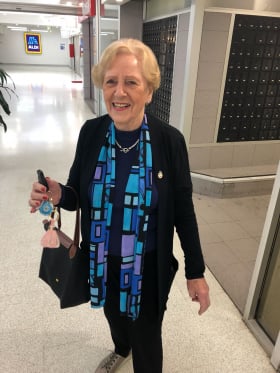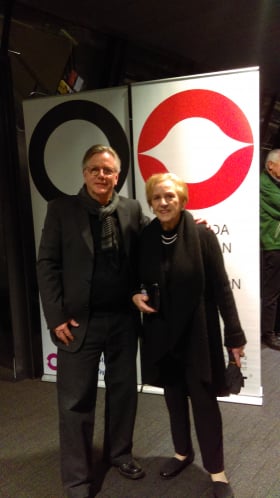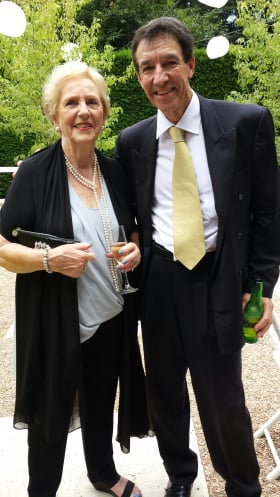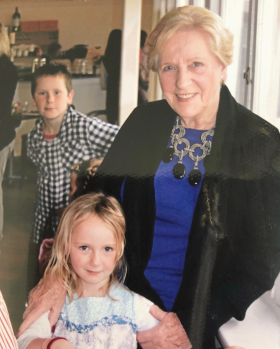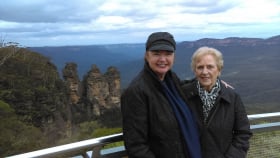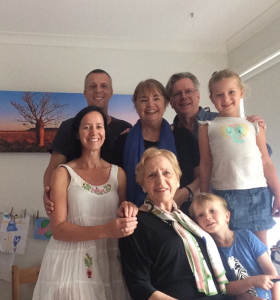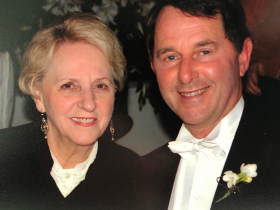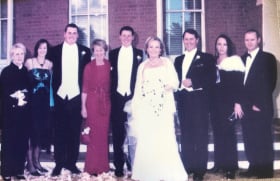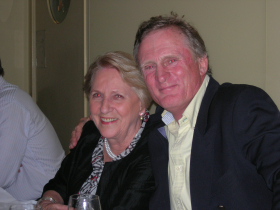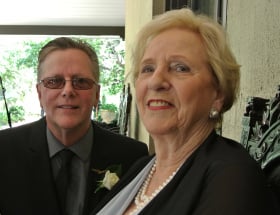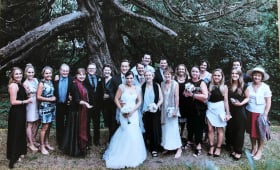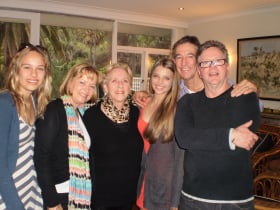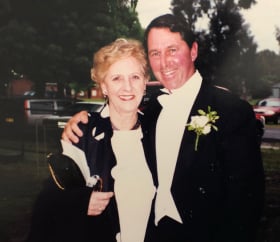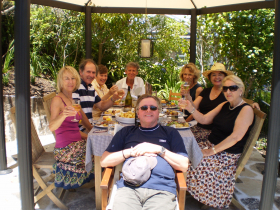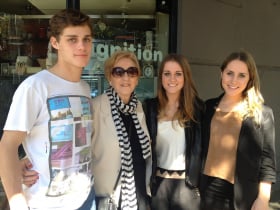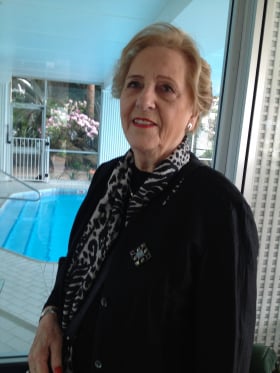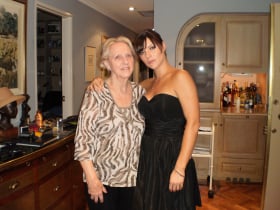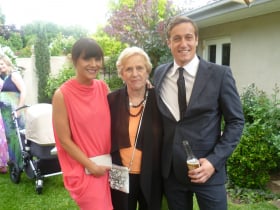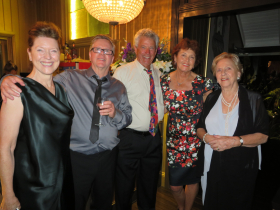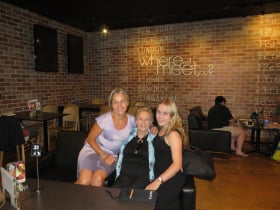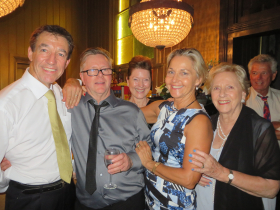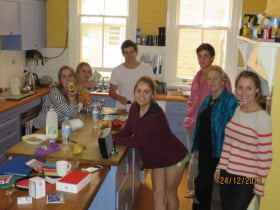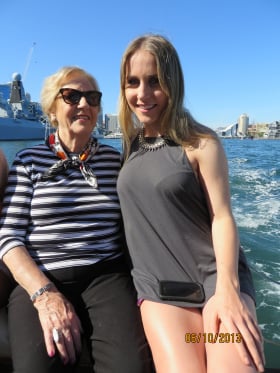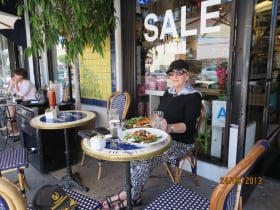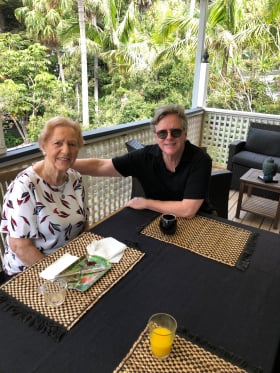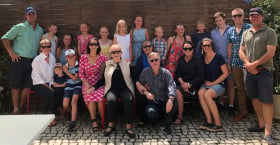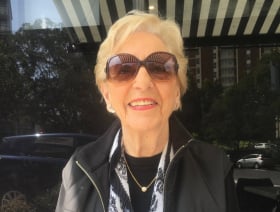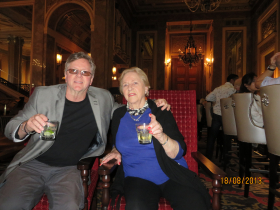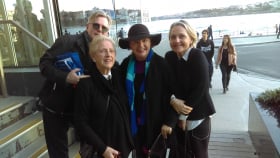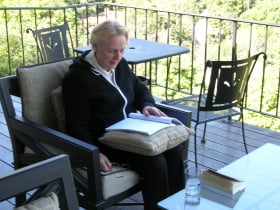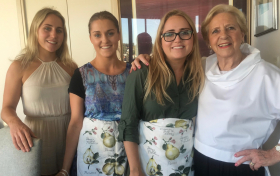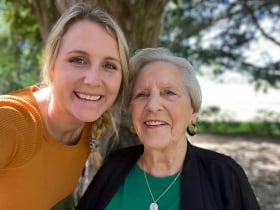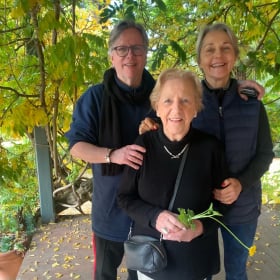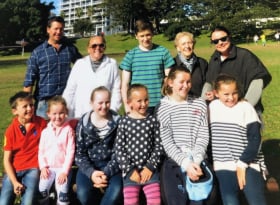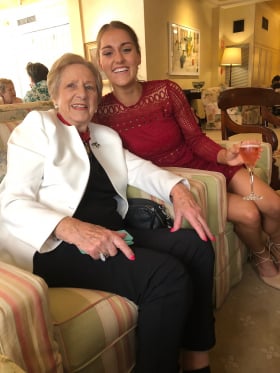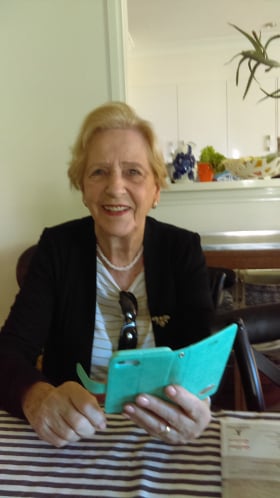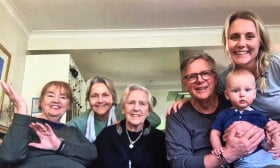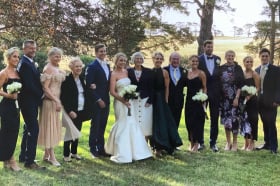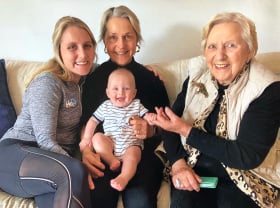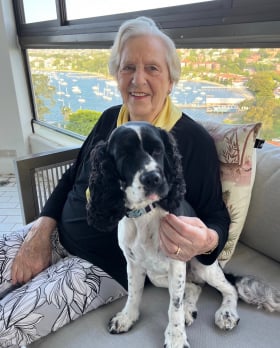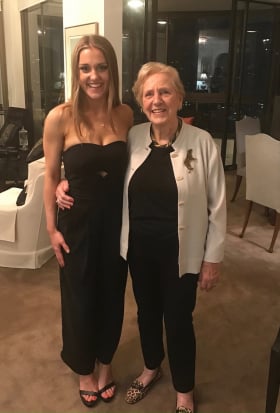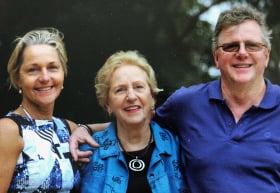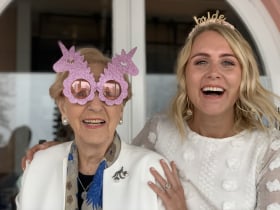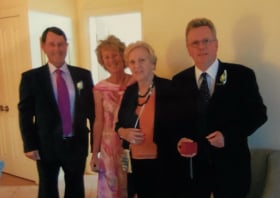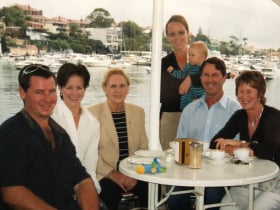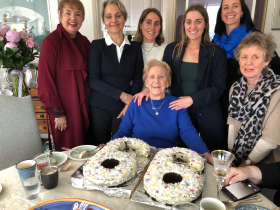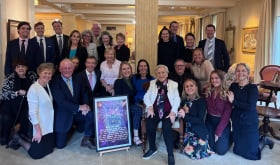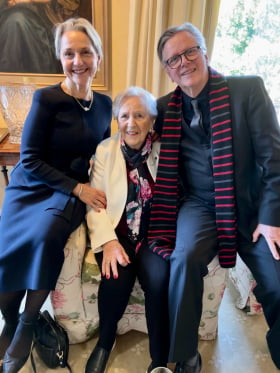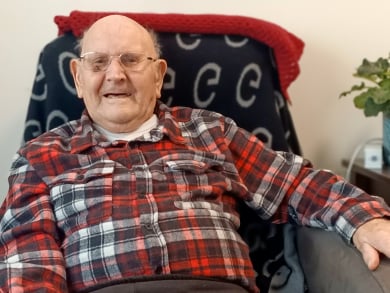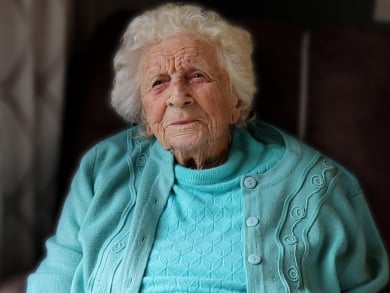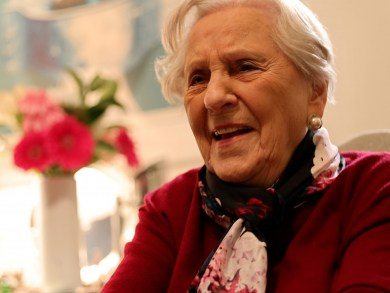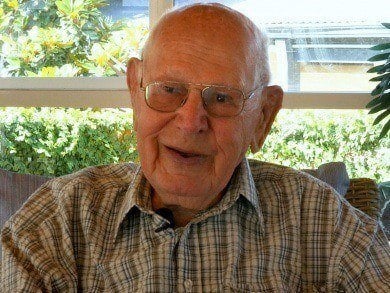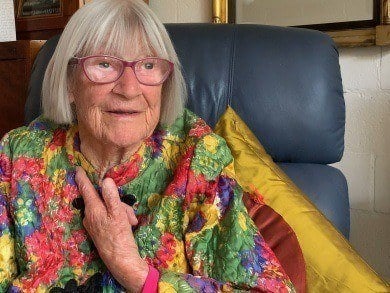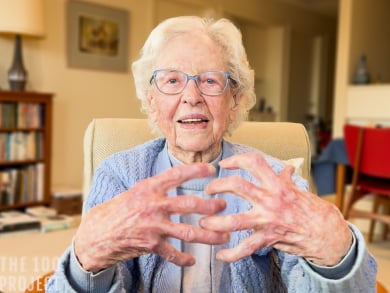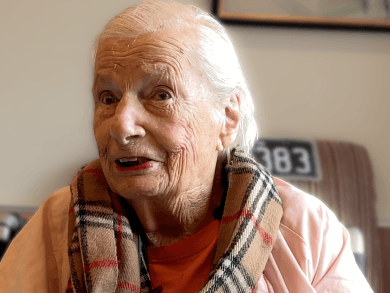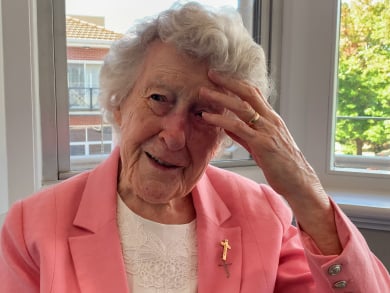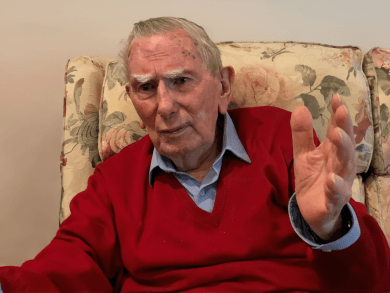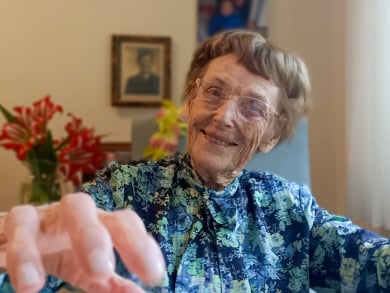My name is Paula Bowman and I was born
on the 1st of June, 1922 in Yorkshire.
I had a beautiful family.
My father was in textiles.
Two girls and two boys in the family,
which was really nice.
So made me have a wee bit of a tomboy I’m
afraid.
And I was sent away to a French convent
at the age of seven
and didn't like that at all.
So I ran away a few times
just to cause a sensation.
I settled down after a few years.
So I ended up by leaving after
ten years as Head Girl.
So I was very proud of that.
I was captain of the hockey team.
And I loved netball too.
Every Saturday morning
we’d go on the beach
and if the tide came in, didn’t matter,
the horses loved being in there,
a little bit of water.
And then every year we'd would have
a gymkhana. We’d
have an egg and spoon race on horseback
and oh, I used to love, love riding.
I think I would have
been about eight or nine or something.
I was dying for a pair of shorts.
My father said, “Girls don’t wear shorts”.
So I got pretty sick about this,
and I said to my brother.
“Can I borrow your cricket shorts?”
They had little white cricket shorts.
And he said, “Yeah, yeah, yeah”.
So we were in this very smart hotel
in Belgium at the time
and I put on these little white shorts
and the shirt, and went down to breakfast.
My father saw me
coming in the dining room.
He nearly died. He couldn't believe it.
Couldn't
really make a fuss in the restaurant.
So after breakfast, he took me outside,
got mother to get her little box camera
to take a photograph of me with him.
He had his long, white flannels on
and I had these little white shorts.
And I've got the photograph today,
which meant a lot to me at the time.
But in the end, he just gave up,
I think, anything I wanted to do...
because I’d do it anyway.
I don't
think it was a very nice
little girl, was I?
Yeah?
Anyway,
leaving school,
I wanted to study architecture
but my father said “Girls don’t so that.
But if you really want to do it, if you go
to a finishing school first, in Denmark,
and when you’ve finished there
and you still want to do it, well,
we'll think about it.”
So overnight,
war was declared and I had a cable
from the Danish consulate
to say, “don't leave England,
war is inevitable”.
And just as well because they bombed
Esbjerg the following day
where I was to land.
Because I can't be just idle,
I went to the university
and did a Social Diploma course,
which was very interesting.
And at night time I used to work
for the Red Cross and I’d volunteer.
And I did weekends as well.
And it became a big thing in my life. And
nurses
were very, very short in those days.
And so they asked us,
would we take an abridged
nursing course
and go to York Military Hospital?
So my friend Margaret
and I decided, why not, we'll do this.
So we did.
So we gave away everything we were doing
and went to York Military Hospital.
That was quite a
difference in our lives, I could tell you.
And many, many homes in England
were turned into camp reception stations,
hospital relief.
And we ended up in Hull where
they were unloading hospital ships
and there were V-bombs
coming over in Hull
which was pretty terrible.
So that was quite terrifying.
But anyway,
we were young and we coped pretty well,
but it was a lot of experiences
for a girl who had just left school.
And I met a lot of
girls that I normally wouldn't have met.
One of the places that we were moved to
was Ranksborough Hall,
which was a beautiful old home
that had been given over
by the ‘Master of the Hunt’.
And the main homestead,
of course, was the hospital.
There’s a photograph of me
actually looking out of the window.
The stables underneath
were full of ambulances
and we were billeted where the grooms
would be.
Your sugar ration was in a little jar.
We had three little jars on the table
in front of you,
one for your sugar, one for something else
and one for something else
with your name on them.
And that was yours for a month.
That was to last a month.
But everybody was healthy.
We were all slim and
we had enough for our energy.
It was an amazing ration.
And I always said
that if they put that ration into a book
and sold it for diets...
that's what would be good.
One day they had a message from the local
aerodrome
saying
they were having a party in the mess
and would they send over five nurses
or whoever was off duty
to join the party for obvious reasons.
And so Margaret and I were off duty
and we were one of the five.
We went there with an escort,
a matron, very strict matron,
and we were formally introduced
to all the fellows,
which today would be unthinkable.
But that's that's the way it worked.
And of course, being
well brought up young ladies,
we danced with whoever
we were introduced to.
And then halfway
through, then we changed partners.
And that is how I met my future husband.
Because Margaret's partner was given to me
and that was it.
She never got him back again.
His name was Arthur Bowman.
So that was the beginning
of the romance really.
And it was a long way from town
where we used to go to the...
there was a pub there.
And one day he said, “Do
you think you could come
next time without uniform?” They’d
seen nothing but uniform for so long
and just wanted women to look like women.
I said, “Margaret,
have you got anything apart from uniform?”
because we had to go out in our uniform.
I said, “I’ve got a jumper
and I’ve got a tweed skirt or something”.
Nothing very exciting
because we didn't have in those days.
And so we did.
And my hair was down here.
Pageboy, you know.
So I just put a bit of ribbon,
bit of navy blue ribbon around my head.
And we had to cycle into town.
Oh Tina, you have no idea!
In pitch dark.
And had these little
lights on
the front of the bicycles with shutters on
because it had to do that.
That's all you were allowed.
Night in the dark.
In the country.
All the way from Ranksborough Hall
all the way down.
We left our bikes outside the hall there,
and then we had to cycle home at midnight.
It was uphill all the way!
I'll never forget that.
And then we were posted
elsewhere, over to Ely
And so that was the end of that
for a while,
until I had a message from Arthur,
my future
husband, to say that he was getting
leave and could I get leave?
And I wrote back and said, “No I couldn't
get leave at all during that period”.
So he said, “Oh well, I’m
coming over anyway”.
And I was stationed
at this time
in the Bishop's Palace in Ely,
which was absolutely beautiful,
and there was a big garden seat there,
and he used to sit on that seat
and wait for me to come of duty.
I said, “You've got leave”.
“Yes”.
“Well where is your crew?” “Oh
they’ve all gone up to London”.
I said, “Well
why aren’t you going up to London?” “Well
I didn't want to go,
I wanted to come and see you”.
So that was really the beginning of things
I think.
So anyway, he was a pilot
and he’d been into Bomber Command
and he'd been over to Europe
and he was partly traumatized
at times himself.
But nobody called it that in those days.
They just said they were tired
and you know, needed a break.
He was in what they call
Wellington Bombers.
I saw the Wellingtons setting off
one night to go over to Germany
and they were fabric
and they were literally shaking.
Awful to think that men
were saving their lives in these machines.
Anyway, he was soon transferred to
the Lancasters, which were much superior.
They really saved the War.
Wonderful machine.
Mother was working for the Red Cross.
Only rolling bandages and things but
she was doing something for the Red Cross.
Everybody was doing something.
And then if or as say,
we had a house maid
and another one you know
but they had to go,
they went on munitions.
So that's how we ended up with just Betty.
And my brother
Desmond, aged 22,
a fighter pilot, was killed in Burma.
And that was devastating for my parents.
Absolutely devastating.
The government wanted me
to take compassionate leave,
to try and do something with my parents
because my father was a workaholic,
was just sitting
traumatized,
and my mother the same.
They weren't drinkers
so they weren’t even drinking.
They just had cups of tea,
sitting, looking at one another.
It was all...
Didn’t move from the house.
So anyway, after a little while, I did
eventually get my father back to work.
It was Christmas time
and I suggested to my parents
that I had this lonely Australian
who had nowhere to go for Christmas
and how about, you know,
I said, “How about, would it be
in order to have him for Christmas?”
“Oh, yes” said my father, “provided
you don’t get fond of the fellow”.
Nearly said, “It's too late for that”,
but I didn’t.
Anyway, eventually I did get him over
to Beech Lodge, my home.
We went in to Leeds
just to do a bit of looking at the shops
and have a cup of coffee
and things like that.
And over the cup of coffee,
suddenly Arthur said to me, “When
are you going to
marry me?” And I said, “Oh,
why?” And he said, “Well,
when are you going to marry me?”
And that was the proposal.
That's all he said, as if to say, “I know
you want to, you know”.
That's all he said.
So anyway, we decided there
and then we wanted to become engaged.
So when we got to Beech Lodge, my home,
he asked to speak to my father.
So he was locked in the dining room
with my father
and put through the gamut
I might tell you.
And he was there for ages
and I was sitting on the stairs outside
thinking, “Goodness
me, this is going on for hours”.
So the poor man really went through it...
and my father's questions,
but in the end he won him over
and we were allowed to become engaged.
So that was the beginning of everything.
My father made the stipulation:
we were allowed to become engaged provided
we didn't get married
till after he’d flown
his complete tours over Germany,
which was understandable
having lost my brother.
And also my father
wasn't too keen on me going to Australia.
So he said to my future husband,
he said, “Would
you like to stay in England?” And he said,
“Well, yes, I could do that
and continue with my accountancy
after the War”.
My father said, “Well,
if you’ll do that I can article you
to an accountant in Leeds
and you know your future will be assured”.
So anyway, I was asked about this
and I said, “I don't marry
an Australian to
expect him to stay in my country,
if I'm marrying an Australian
and he wants to go home,
where his inheritance
is, that's where we should go”.
After we had
gotten the okay to get engaged,
my father, of course, to leave
no stone unturned,
decided to put a solicitor
on to the Bowman family,
which I was marrying into,
to find out something about them,
and unbeknownst to him,
my future
mother in law was doing the same thing.
And to my amazement,
I never knew until many years later,
that they were both using
the same solicitor.
Freddy was my matron of honour.
Didn't have any bridesmaids,
just my matron of honour
which was my sister
because she was already married.
I had nothing to wear, I mean I didn’t
go to a couturier
and have a wedding dress made.
We just bought something off the peg.
Literally.
And you had to have coupons.
So the family gave me
some of their coupons
so eventually we had enough coupons
to buy the dress.
I wasn’t very fussed
what I wore to be honest.
But there’s quite a nice shot,
quite a photograph isn’t it?
All the ones in the Australian uniform,
there’s two
I think, two in English uniform,
the lighter color.
And then on the other side
was Malcolm and Freddy
and the rest of the crew.
Many moons later of course
I became pregnant
with my first son, Arthur.
And so I got maternity leave.
That was really nice to be home
with my parents,
but they thought I was very silly
to have done that.
But anyway, they knew they would never
stop me doing whatever I wanted to do.
They never could. So, for us
to get to Australia, I had to go on
what they called the ‘Bride Ship’
and I couldn't tell you the performances
that went on that ship.
It was delayed for two weeks
because there was so many children
that they decided
they ought to have a child
specialist on the ship.
But actually,
I think we were waiting for the doctor
to qualify because his knowledge was nil.
My father drove me up to Southampton
to get out on the Stirling Castle
and when we got down
he said, “My dear child,
you must love him a lot
to do what you're doing.
Getting on that ship,
you don't know where you’re going to
with a little boy.” He said, “It
just must be the right person”.
So that was... He was obviously...
He’d lost his son
and now he’d lost a daughter.
So I could understand his sadness, really.
I said to my father,
“Please don't ask for any
special things on the ship for me.
I've got to go
the same as all the other girls”.
Little did
I realize, who the other girls were, but
he must have done something
because I had a cabin
with a hook-on bassinet for the baby
and only one girl
who didn't have a child in this cabin.
And I had my bathroom as well.
Now most of the girls,
there were five to a cabin,
with children.
I don’t know how they managed
but so many of them were so dreadful.
These girls used to lock their children
in the cabins.
There were a lot of toddlers.
Lock them in the cabins
and sleep with the officers.
And as for hygiene,
there was nil on the ship.
They didn't even bother
to wash the napkins.
No disposable in those days.
Anyway, it
ended up by getting
this terrible gastroenteritis
and I befriended
one girl,
who had married a teacher in Melbourne,
and she had a little girl called Betty,
same age as Arthur.
About nine months I think she was.
And she died on the way at Fremantle.
Must have been devastating
to that girl to land
and tell her husband
that the baby had died on the way.
You know, must have been horrifying.
Well Arthur got very sick
but he looked very healthy.
When I left, he was a big bouncing boy
and therefore he had a lot of resistance.
He was never a weakling.
And so when we came off the ship
in Sydney,
we had to line up to have a health test
and the doctor looked at Arthur and said,
“Well, you're a healthy young man”.
And I just said, “Yes”.
I made out he was very healthy
because I just couldn’t
get ashore quick enough
because I knew the doctor was no good.
So anyway, Arthur alerted his...
when I arrived, he alerted his uncle,
who was Dr Dougal Bowman,
who immediately got a bed at Children‘s
Hospital, Camperdown,
and Arthur was taken there.
And when he arrived he was very ill
and they said to Arthur and I, “Don't
leave the hospital, sleep
in the chair tonight.
We don't like your chances”.
So it was pretty devastating.
Anyway,
in the morning
this little cheeky boy was sitting up
in the cot giving the nurses
and clapping and going on.
It was dehydration
and the poor child
was given an intravenous...
and he was cheeky
and sitting up in the morning...
And was absolutely fine.
It was pure dehydration,
from the gastroenteritis.
Anyway, we were very lucky
that we got him to hospital in time.
Kanimbla Hall was a tiny apartment,
but it was ours
and it was just lovely to have it.
But I had no laundry.
It was just a bathroom,
a bedroom and
the living room and the balcony.
The balcony had a piece
of awning that came down
and that is...
we put the awning down and we put a cot
for Arthur on the balcony,
and he literally slept on the balcony
all the time.
That was his room.
There was a little kitchenette.
There was a little fridge,
a little stove and everything was tidy.
And I wasn't a cook anyway.
I had never cooked in my life.
A passionfruit.
I did know what they were and I said,
“What are those?”
He said, “Oh, absolutely delicious.
Put them into the fruit salad.”
So I said, “Oh alright.”
He said, “What
are you doing in the kitchen for so long?”
I said, “This stupid fruit
you bought, by the time
I’ve taken the pips out, there’s
nothing left.”
We'd been in Sydney
for quite a while and it was time
we felt that I met my mother in law.
So we didn't have a car,
so we went by train to Singleton
in the hottest day ever.
I think it was 103 in the shade
or something
with this little boy in the train.
And we got to Singleton
to be greeted with my mother in law,
who was very voluptuous
and rather frightened the little boy.
But anyway, it was my first encounter
with my mother in law.
And that she had this Jaguar car,
put us into the Jag,
sat in the back of the car
with a little boy who was dehydrated
at the stage, on a dirt road,
all the way to the property.
I thought we were never getting there
because I wasn't used
to the Australian countryside.
The homestead and three
share farmers houses.
They were all into dairy.
Beautiful property over the Hunter River
running down the the bottom of it.
The property was left to my husband
at the age of six.
His father died when he was six
and he was the only
boy it was to go to him. But
as they did in wills in those days,
it was left to my mother
in law for her lifetime
and that that was the way
they made wills in those days.
And so long as she didn't marry,
it was her property.
But if she married, which she never did,
it was to go straight to the son.
Anyway, one day
Arthur came home from work,
it was in Le Maistre Walker
in Sydney and he said,
“Would
you mind going to live in the country?”
And I said, “Well,
I've come across the world.
What’s the difference?” Living in
the country was quite a new thing for me.
I wasn’t experienced at all
but you learn pretty quickly.
The country friends that we made
have been with me for the rest of my life.
I mean most of them have passed away
now, but we've had some
amazing times with them.
I cannot believe
that I am still here
30 years after my husband passed away.
We were the same age.
We were both 70 when he died,
which is pretty dreadful.
And then later, my son
Arthur, he passes away.
Same age, 70.
It's been the tragedy of my life
really.
It’s a bit difficult, but I still have...
I'm still fortunate enough
to have my son, Antony, and
my daughter, Tina,
ten grandchildren, 16 great grandchildren,
which means I’ve got 26 grandchildren,
which is not too bad,
although I have lived 100 years so
that's my reward I expect.
Ever since childhood,
I’ve been interested in art.
We had a really nice studio
when I was at school and my happiest time
was when it was an art day
and we could go in there and paint.
And I did...
my first painting was a ship
on the shore at Filey Beach.
And I’ve still got the painting today.
1937 or 36
or something, which makes me about 12.
When COVID started
and there was isolation,
I had a lot of friends
who were in retirement homes
or nursing homes and weren’t
as fortunate as me.
And you couldn't visit them
because of COVID.
So I started doing little cards,
painting images on cards
and drawing flowers and birds and things,
and sending them
these cards.
Favourite owls.
A lot of my friends would say, “What
do you do all day, it’s so boring
when there’s nothing on television?”
I said, “Television?
I don't get near the television
set til the 7 o’clock news”.
And they say, “Well,
what do you do all day?”
I said, “I draw and I paint and carry on”.
And I said, “I find it very interesting”.
